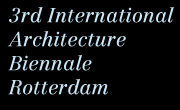| PowerNotes #04 Joan Ockman about the master class | |
Joan Ockman is one of the three masters of the Master class Form and the City. The other two masters are Elia Zenghelis and Pier Vittorio Aureli. | |
| Rotterdam - Wednesday 23 May 2007 How do you see power in relation to the master class? Pier Vittorio Aureli and I have been collaborating for the last year on a project concerning the relationship of architectural form to politics and the city. We call it the FORuM Project, with the "u" in FORuM standing for "urban." The master class is part of this project. We believe that this way of thinking about form has been neglected in recent decades. Especially in the wake of the famous "Bilbao effect," architectural form has come to be about making spectacular images and objects, and for good reason has been stigmatized by many as "empty." We are trying to rethink and rehabilitate the idea of architectural form by placing it back into the city in relation to social realities, power relations, and civic consciousness.
Do you see similarities between Rotterdam-South and, for example, places like Brooklyn in New York? Certainly there are differences. The lack of density here is not very comparable. There is an overabundance of public space in Rotterdam, hardly the case in New York. On the other hand, there are some interesting connections. For years Brooklyn was also thought of as the other side of the river, a place with dangerous neighborhoods and nothing much to attract new residents except cheap rents. Now large parts of it are undergoing major redevelopment and it has become a very desirable place to live. It is poised to become a world-class city in its own right in the not too distant future. Of course, among the things that made this transformation possible is that Manhattan became so crowded and so expensive that people had no other place to go than through the tunnels and bridges to the boroughs. The general lack of density in Rotterdam probably precludes something similar happening here, at least for now. At the same time, Brooklyn's current success can also be a cautionary tale. The rampant process of development has brought increasing gentrification with it as a downside.
| Can Rotterdam take a lesson from cities like New York? Well, to take a different kind of example of gentrification, one that may or not have implications for Rotterdam, the revitalization of Times Square in the 1990s as an entertainment district was catalyzed by the arrival of the Disney Company. Everyone was horrified. How could Mickey Mouse take over the center of Manhattan? Yet what you see now is that despite a kind of encroaching suburbanization going on in parts of the city, New York hasn't lost its identity, its diversity, or even its urban grittiness. True, Times Square is a riot of advertising and signage, but it's just one piece in the big fabric and continues to be modified and qualified all the time by daily life. The city is very dynamic, and precisely its size and complexity give it innate resources to resist or adapt to "artificial" impositions.
Can a Multi Functional Accommodation (MFA) be a generator? A generator of what? The master class wants to contest bland economic formulas like "multifunctional accommodation," on the one hand, and the hype of the spectacular building or "icon," on the other. As I said, we are trying to give the problem of urban form much more serious reflection. Architecture is always a form of symbolic representation, an embodiment of conscious and unconscious meanings. Architects need to be rigorous and strategic about the language they use, both formal and verbal, not fall reflexively into marketspeak. Talking about "MFA's" seems to me almost a guarantee of producing a generic, knee-jerk solution to the incredibly challenging task of creating community, identity, and empowerment in Rotterdam South. |
POWER -
Producing the Contemporary City
24 May - 2 September 2007
Producing the Contemporary City
24 May - 2 September 2007
Nederlands | English
"The informal city doesn't produce garbage. It recycles itself." (Alfredo Brillembourg and Hubert Klumpner in Carácas. The Informal City, 2007)

